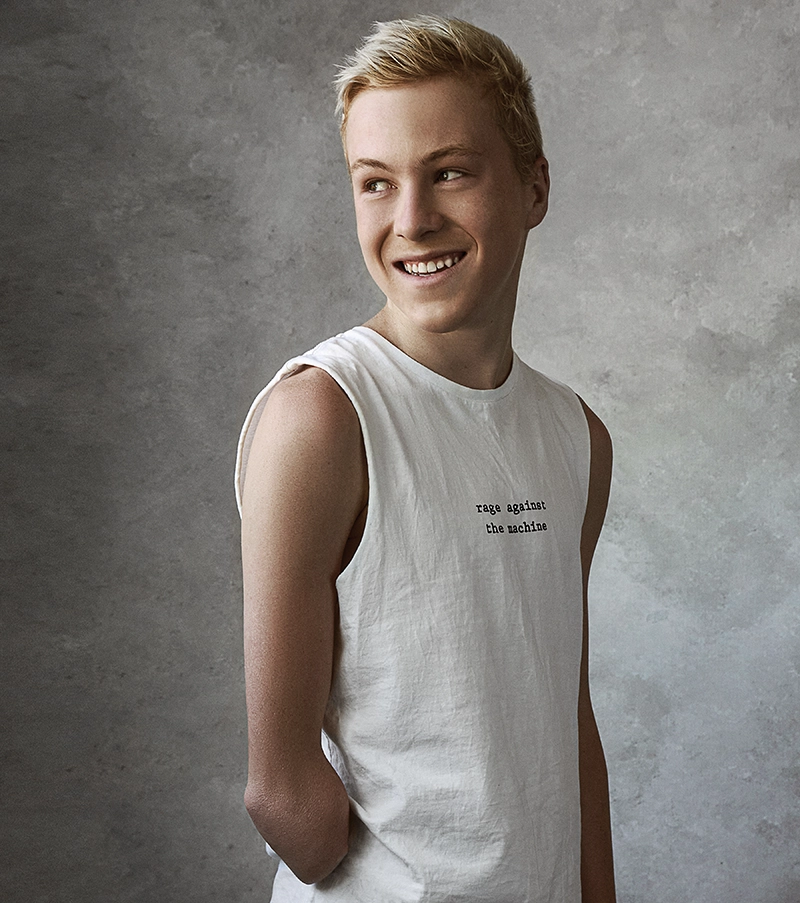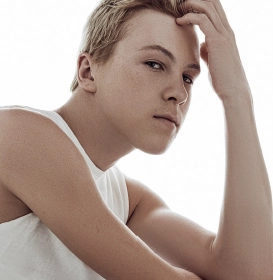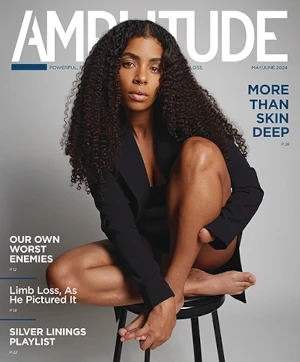The Hunger Games costar shares his thoughts about limb difference, parasports, and the joys of playing the bad guy.

by Larry Borowsky • Images by Klaudia Polanska
Knox Gibson and his family had just finished rewatching all four Hunger Games films in early 2022 when the call came.
“We’ve always loved those movies,” the 16-year-old Australian says. “We’d been quarantining [during COVID], and we’d literally just watched them all again when the audition request came through. It was a sign, to be honest.”
The audition was for a new episode in the Hunger Games series, a prequel called The Ballad of Songbirds and Snakes. “They didn’t actually tell us it was for the Hunger Games,” Gibson says, “but we figured it out.” He got a callback, then landed a fairly meaty role as Bobbin, the male tribute from District 8.
Not a bad gig for an unknown actor from a small town nearly 200 miles west of Sydney. And it’s all the more remarkable in that Gibson—a below-elbow amputee since the age of three—will be playing a character who was originally conceived as nondisabled.
“Bobbin doesn’t have a limb difference in the book,” Gibson explains. “The limb difference [in the film] is just incidental to the character. I don’t wear a prosthetic or anything. It’s not explained. It’s just that he’s an amputee, that’s all.”

Before Songbirds, Gibson had only appeared in one film, a well-regarded Netflix short called Forgive Us Our Trespasses. That performance brought him to the attention of C Talent, one of the world’s top management agencies for models, actors, and other creatives with disabilities. “They brought us the Hunger Games audition,” Gibson says. “I was really lucky. I skipped the whole Australian acting scene and went straight overseas.”
With a budget estimated at close to $200 million, Songbirds and Snakes is one of the first blockbuster movies to feature an amputee actor in a prominent speaking role. Because the actors’ union was still on strike during early autumn, Gibson wasn’t available for interviews as publicity for Songbirds and Snakes shifted into high gear. Fortunately enough, we’d connected with him back in February, before the walkout began. We’ve drawn on that conversation and other sources to highlight nine things we think you should know about this rising amputee star.
1. HE’S NAMED AFTER A MOVIE CHARACTER. “There’s a character named Knox in Dead Poets Society, and I guess Mum and Dad both liked the name,” Gibson told an Australian podcast, “The Coach and the Doctor.” The character in question, Knox Overstreet, is an entitled New Englander from a wealthy family, full of grandiosity and romantic affectations. Gibson, a down-to-earth country boy with a self-deprecating sense of humor, has almost nothing in common with his namesake. “If I wasn’t acting, I’d probably just be playing more rugby,” he says.
2. HE’S A MEDAL-WINNING SWIMMER. An avid all-around athlete, Gibson has had his eye on the Paralympics since his tween years. He considered training as a triathlete, but the heavy time commitment just didn’t fit into a schedule already packed with school, modeling, acting, and advocacy work.
“I’m usually doing seven pool sessions a week,” Gibson says, although he wasn’t able to swim during the four-month Hunger Games shoot. Despite the long break from training, Gibson took bronze this summer in the 200-meter individual medley at Australia’s national meet for boys ages 14 and 15, exceeding his own expectations. He’ll be 21 years old when the 2028 Paralympics are staged in Los Angeles. Is that a target? “It’s hard to say,” Gibson says. “The qualifying times for 2024 haven’t even come out yet. We’ll take a look at those, and then there are the 2026 Commonwealth Games. One step at a time.”
3. HE’S A FIERCE ADVOCATE FOR DISABILITY RIGHTS AND REPRESENTATION. At the age of nine, Gibson became an ambassador for Starting With Julius, an Australian nonprofit that promotes authentic representation of disability in entertainment and advertising. He later teamed up with Aussie Hands, a nationwide support network for people, especially children, with upper-limb differences.
“The best thing about having one limb is being able to educate people,” he says. “Australia is still not as far advanced as the USA for having acceptance of disability. You get the people who stare, or when I’m at the pool, I’ll hear people saying, ‘Oh, the poor thing.’ And to me it’s just kind of funny. We’re just people. I’ve had people tell me I can’t do things, and I’m a very competitive person, so if someone tells me I can’t do something, it makes me that much more determined. I’ve always been grateful for my accident. I know a lot of people with disabilities view it as a burden, but I think it has made me a lot better.”
4. ONE OF HIS FAVORITE ACTORS IS DANIEL CRAIG…. “I really like the way he showed he can change character,” Gibson says. “He went from being James Bond for so many years—this stone-faced Brit who does all this action stuff—and he switched to this guy in Knives Out who’s got a French name [Benoit Blanc] and a strong American accent. I was really impressed with how he showed that can do other types of roles.”
5. ….BUT HE’D RATHER PLAY A BOND VILLAIN THAN 007 HIMSELF. “I feel like when everyone hates you, that’s kind of the ideal character for me,” he laughs. “All my friends say I’ve got the perfect look for a villain—I’ve got the blonde hair and the squint. All the James Bond villains are blonde and that sort of thing.” If Gibson ever gets cast in such a role, he’ll become just the second Aussie to play a Bond antagonist. The first, Guy Doleman, appeared nearly 60 years ago as the nefarious Count Lippe in Thunderball. Bond was also played by one Australian ac-tor, George Lazenby, in 1969’s On Her Majesty’s Secret Service. Aussie actor Jacob Elordi has purportedly been under consideration to replace Craig as the next James Bond.
6. HE’S NOT THE FIRST MOVIE ACTOR FROM HIS HOMETOWN. Gibson grew up in Orange, an agricultural town of roughly 35,000 inhabitants. Known for its gorgeous produce, sprawling vineyards, and colorful autumn foliage, Orange is one of the few towns in Australia that gets regular snowfall in winter. The nation’s most famous poet, Banjo Paterson (author of “Waltzing Matilda”), is an Orange native, as are a handful of well-known actors. The first and most prolific, Billy Bevan, decamped to Hollywood in the 1910s and became a regular in Mack Sennett’s comedic troupe, appearing in some 250 films. More recently, Orange High School alum Elizabeth Lackey costarred in several television shows on US networks during the 1990s and early 2000s.
7. HE OWES HIS LIFE TO A LUCKY BOOT. Gibson lost his arm in an accident that occurred on his grandfather’s farm when he was three years old. He’d been instructed to wait in the car while his grandfather did a bit of work on a riding mower, but he got bored and ended up playing on the grass behind the machine. When his grandfather threw the mower into reverse, Gibson wound up trapped underneath with his arm severed and one of his legs lacerated down to the bone.
“Funny story,” he told ”The Coach and the Doctor.” “My boot got snapped off my foot and jammed the blade on the lawnmower, and that basically saved my life. Grosby [an Australian boot maker] sent me about ten pairs when they heard the story.”
8. HIS MOM, KATE, IS HIS GO-TO READER FOR AUDITIONS. “She’s one of the helpful mums,” Gibson laughs. “I’ve talked to other actors my age, and their mums literally show no emotion; they just read what’s on the page with a flat voice. But a lot of acting is reacting off what else is happening in the situation, so it helps when Mum is actually trying to put some emotion into the reading. It helps me perform a little bit better.”
9. IF HE WASN’T ACTING, HE’D BE PURSUING A CAREER IN…. “…something related to sales, I think,” Gibson says. “Probably real estate. Or maybe fund management, where you’re investing other people’s money and you just take your cut. Although I’ve always thought I could be a good lawyer, because I’m good at arguing. I could still start down that line, there’s still time.”




